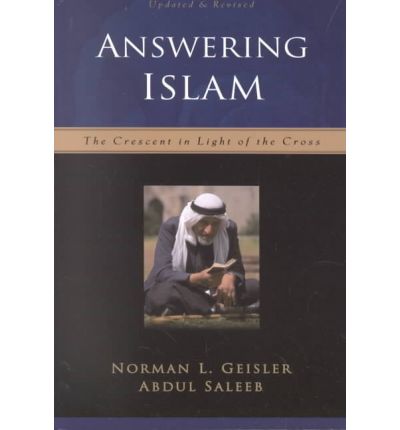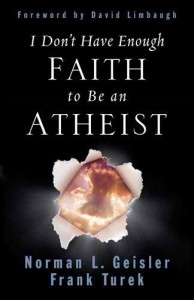Answering Islam: An Interview with Norman L. Geisler (1994)
Answering Islam: An Interview with Norman L. Geisler
by Ron Rhodes
1994
Norman L. Geisler is a theologian, teacher, and the dean of Southern Evangelical Seminary in Charlotte, North Carolina. He has recently co-authored a book with Abdul Saleeb entitled “Answering Islam: The Crescent in the Light of the Cross” (Baker Books). In this issue of the “Newsletter”, Dr. Geisler is interviewed on a variety of issues related to this book.
Newsletter: Why do Christians need to be concerned about Islam?
Geisler: One out of every five persons on the face of the earth is a Muslim. One out of every five! In the United States Islam is growing at an astronomical rate. There are more Muslims than Methodists in the United States.
These are people who are diametrically opposed to Christianity’s most central belief — that Jesus Christ died on the cross and rose from the dead. Historically and theologically, many Muslims have been committed to the annihilation of unbelievers — which includes us.
Muslims believe Christians have committed the unpardonable sin of attributing “partners” to Allah — namely, belief in the Trinity. In Saudi Arabia they recently cut somebody’s head off for blaspheming the prophet Muhammad, which, by definition, my co-author (Abdul Saleeb) and I do on practically every page of our new book. Islam is a serious threat to Christianity.
Newsletter: But this book is not written in a hostile fashion towards Islam, towards the Qur’an, towards Muhammad, is it?
Geisler: No, it’s not. We take an objective, dispassionate, scholarly approach in dealing with (1) what Muslim’s believe (and, by the way, we believe a Muslim could pick this book up and agree with how we’ve described Islamic beliefs); (2) a Christian response to Islamic beliefs; and (3) an apologetic defense of what we believe as Christians.
Newsletter: Muslims are monotheists, right?
Geisler: Yes. Monotheism is the belief that there is one God. Jews and Christians are monotheistic. But Muslims are the most rigid monotheists in the world. They believe there’s not only one God but that there’s only one person in God (i.e., God doesn’t have a son). They confuse unity and singularity. Any other persons associated with God is considered blasphemy. It’s the great sin. God has no partners, Muslims say.
Newsletter: So, to say that Jesus Christ was the Son of God and that He was equal with God would be considered anathema.
Geisler: You just lost your head in Saudi Arabia!
Newsletter: Muslims say Muhammad was a prophet. And Muhammad in the Qur’an said Jesus Christ was a prophet. Assuming that prophets do not speak error, wouldn’t this present a logical problem for Muslims? After all, according to John 14:6, Jesus said, “I am the way and the truth and the life. No one comes to the Father except through me.” So, Jesus the “prophet,” being one-hundred percent correct, refutes Muhammad and all of Islam, right?
Geisler: That’s correct. And that’s a good approach to use. But you need to keep one thing in mind here. What Muslims say to that line of reasoning is that while they believe in the Christian Gospels, which represent Christ, they’ve been corrupted down through the centuries. And so Christians must answer that allegation.
We do this in our book, Answering Islam, by showing that we have manuscripts of the New Testament that go back hundreds of years prior to the time of Muhammad. Now, keep in mind that Muhammad referred to the New Testament Gospels of his day — and indicated their reliability. After all, he said to Christians: “Go and look in your own Gospels.”
Well, if the Gospels of his day (A.D. 600) were accurate — and we’ve got manuscripts that go back even before that — then they’re in a pretty tough dilemma to explain why you shouldn’t follow the logic you suggested above: Jesus is a prophet; He always teaches the truth; and if He taught He was the only way to God, then how can Christianity not be true?
Newsletter: What specifically does the Qur’an teach about Jesus Christ?
Geisler: It’s strange that while Muslims think Jesus was only a man — a prophet superseded by Muhammad — at the same time the Qur’an teaches that Jesus Christ was the Messiah, the Word of God, a speaker of truth, a sign unto men of mercy from God. It teaches that Jesus was virgin born, sinless, performed supernatural miracles (including raising people from the dead), and bodily ascended into heaven. All of this is affirmed of Jesus Christ in the Qur’an. The crucial thing Muslims don’t believe is that Jesus died on the cross for our sins and rose from the dead.
One must emphasize to the Muslim that the Jesus of the New Testament claimed to be God, not just a prophet. We have a whole chapter in our book on the deity of Christ. Jesus said, “I and the Father are one” (John 10:30). In John 8:58 Jesus said to some Jews, “Before Abraham was, I am,” thereby claiming to be God (cf. Exod. 3:14). He received worship on many different occasions. One of His disciples bowed before Him and said, “My Lord and my God” (John 20:28), acknowledging His full deity. Jesus forgave sins, which only God can do (Mark 2:5-7). Jesus resurrected people from the dead, which only God has the power to do (John 11:38-44). So Jesus in many different ways is shown to be God, not just a prophet. The Bible and the Qur’an are irreconcilable on these ideas.
Newsletter: Interestingly enough, the Qur’an does not claim Muhammad was a miracle worker, does it?
Geisler: You’re right! And that’s a very important apologetic point. Nowhere in the Qur’an does it record Muhammad performing any supernatural feats of nature. In fact, he disavowed such an ability. When asked, “Why don’t you perform miracles like the other prophets did?” he responded: “This is my miracle, the Qur’an.” The Qur’an is said to be the only miracle of Muhammad.
Newsletter: Speaking of the Qur’an, this book does not portray God as a heavenly Father, does it?
Geisler: No, it doesn’t. There are 99 names for God in Islam. We have them listed in our book. Out of the 99, there is no mention of “Father.” And the reason for that is that Muslims are rigid monotheists. They believe that being a Father implies that he has a son, and that is considered blasphemous. God has no partners.
Newsletter: What is the Islamic concept of God in terms of human beings relating to him?
Geisler: The Islamic God is very remote, very transcendent. He is not immanent; he’s not personally involved with his creatures. The main thing in Islam is not fellowship with God, but service and allegiance to God. There is no fatherly concept of God at all. It’s very different from the concept of God found in the Christian Bible. In Christianity, believers are adopted into God’s family (Eph. 1:5) and can personally address God as Father (Rom. 8:15). It’s a relationship of great intimacy. Not so in Islam.
Newsletter: Islam and Christianity, then, set forth clearly different views of God and Jesus Christ, among other things. Both systems cannot be true.
Geisler: Right! There’s a big difference between the two systems. The answer to the question of truth is of eternal importance. If there’s a substantial difference between the two systems — and if your eternal soul depends on a correct choice of one system or the other — then it behooves everyone to examine seriously all the evidence and make a truly informed decision.
We can’t just say, “Well, I believe it, I was taught it, I was reared that way.” The question is, Which one is true? If Islam is true, Christianity is false. If Christianity is true, Islam is false.
Remember what Jesus Christ said: “I am the way, the truth, and the life, and no one comes to the Father but by me” (John 14:6). If Islam is right, then Jesus Christ was lying when He said that. Muslims say Jesus was a prophet, and prophets can’t lie. So they’re in a real dilemma here.
Newsletter: Any closing thoughts for Christians who want to become equipped for the work of apologetics?
Geisler: One of my teachers — a man who spent some twenty years in the Middle East, and made a great impression on my life — used to say that with regard to education and preparation for serving Christ, Get all you can! Can all you get! And sit on the lid! Then you’ll have everything you need to defend the faith as opportunities arise. Becoming equipped for the work of apologetics is an absolute necessity for Christians today.
End of document, CRN0072A.TXT (original CRI file name), “Answering Islam: An Interview with Norman L. Geisler” release A, July 31, 1994 R. Poll, CRI
An article from the Interview column of the Christian Research Newsletter, Volume 7: Number 1, 1994.
The Editor of the Christian Research Newsletter is Ron Rhodes.
Copyright 1994 by the Christian Research Institute.
COPYRIGHT/REPRODUCTION LIMITATIONS:
This data file is the sole property of the Christian Research Institute. It may not be altered or edited in any way. It may be reproduced only in its entirety for circulation as “freeware,” without charge. All reproductions of this data file must contain the copyright notice (i.e., “Copyright 1994 by the Christian Research Institute”). This data file may not be used without the permission of the Christian Research Institute for resale or the enhancement of any other product sold. This includes all of its content with the exception of a few brief quotations not to exceed more than 500 words.
If you desire to reproduce less than 500 words of this data file for resale or the enhancement of any other product for resale, please give the following source credit: Copyright 1994 by the Christian Research Institute, P.O. Box 7000, Rancho Santa Margarita, CA 92688-7000.

